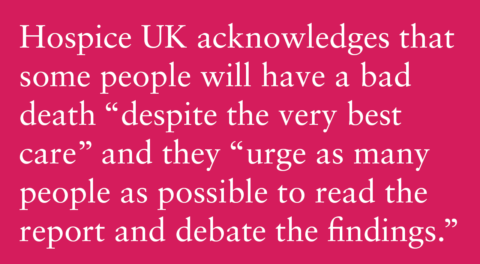A statement from our Chief Executive on The Inescapable Truth report and video
Sarah Wootton responds to a recent statement by the Chief Executive of Hospice UK
Hospice UK Chief Executive Tracey Bleakley recently issued this statement about our video and research report, The Inescapable Truth. This is our response.
Our recent report, The Inescapable Truth, shines a light on the experiences of a small but significant number of dying people. Our research found that even if everyone in the UK had access to excellent hospice care at the end of life, 17 people every day would die without adequate pain relief. The report pays tribute to the incredible work of hospices and all those who provide end-of-life care, but it is unapologetically honest in acknowledging that even the best care sometimes has its limits. It shows how unrelieved pain and other complex symptoms, as well as a lack of control over the dying process, can be unacceptable for dying people, many of whom would want the law to allow them the option of an assisted death.
Therefore we welcome Hospice UK’s statement which acknowledges that some people will have a bad death, “despite the very best care” and the “need to be honest and straightforward with people about what dying can be like”. We also welcome Hospice UK stating that they “do not disagree with the findings in the Dignity in Dying report The Inescapable Truth About Dying” and “urge as many people as possible to read the report and debate the findings”.
To accompany our report, we released a short film to demonstrate the effect that a bad death can have on the dying person and the bereaved families who are left behind. The film was criticised by some healthcare professionals and by Hospice UK as unrepresentative of the experience of dying people in hospices. We were clear from the outset that the film is a fictional composite of some of the real experiences shared in our report. We took advice from clinical and non-clinical hospice staff who said this can reflect a death even despite the best hospice care in a small minority of cases.
We have been inundated with responses from members of the public that the film reflects their experiences of the deaths of their loved ones. We will be publishing some of the comments and feedback we have received alongside this statement. We, along with relatives who had watched a loved one experience a bad death, were appalled that some of those who criticised the film argued with bereaved family members that their experiences were somehow mistaken or misunderstood.
Dignity in Dying believes that dying people in the UK should have access to high-quality end-of-life care of the kind provided by our excellent hospices alongside the choice of an assisted death within safeguards.
We support proposals to give all dying people universal access to hospice and palliative care and believe it is vital that hospices receive adequate funding.
We are glad that Hospice UK have accepted the findings of the report and agreed to meet to discuss our shared goals. This will be an important discussion and we congratulate Hospice UK for being willing to show leadership by acknowledging that bad deaths sadly do happen, and engaging constructively with the debate on assisted dying. This willingness to meet and move forward together is particularly important in the light of recent reports of a culture of silence in some parts of palliative care, with doctors who support a change in the law on assisted dying feeling unable to speak out.
The film has helped to spark this discussion with organisations and individuals who have not previously engaged with the issue of assisted dying and in that sense it has served its purpose. Dignity in Dying has agreed to take down the film at the request of Hospice UK so that these important discussions can take place in the spirit of co-operation between the two organisations. Nevertheless we will always stand with our members and supporters who have spoken out about their loved ones’ deaths, and whilst we are taking down the film, we will continue to acknowledge their experiences.
Sarah Wootton
Chief Executive
